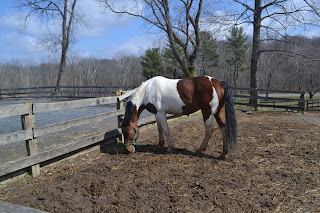Several reasons.
In some cases, it's just personality. Off the track Thoroughbreds often have a strong drive to go fast - because it's been bred into them for generations. The same can be true of stock horses from "running" lines - bred to race or run barrels.
Lack of balance and fitness can also cause rushing - horses have to develop their abdominal muscles in a particular way to carry a rider properly, and the only way they can develop those muscles is to be ridden (just as there are muscles riders can only develop by riding).
Some horses rush because they are anxious and worried. Horses are flight animals and worry makes them want to go fast.
A horse that has had some time off might rush around, especially if they've been sick or lame and unable to run for a bit, just because they have too much energy.
Finally, some horses will rush through an exercise because they want to get it done and stop working or go back to their buddies. I.e., ironically, some horses that go really fast are actually being lazy!













